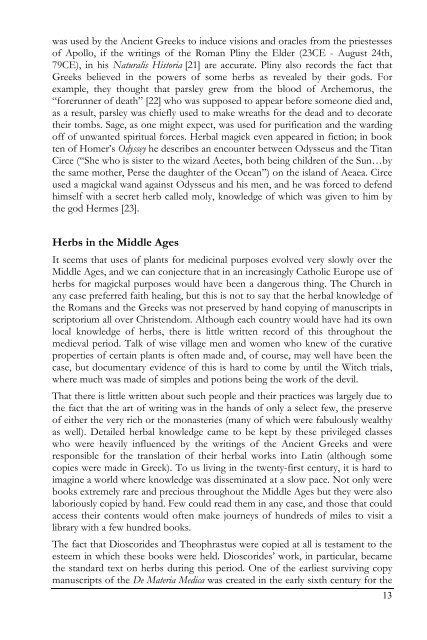A Magickal Herball Compleat.pdf - Magicka School
A Magickal Herball Compleat.pdf - Magicka School
A Magickal Herball Compleat.pdf - Magicka School
You also want an ePaper? Increase the reach of your titles
YUMPU automatically turns print PDFs into web optimized ePapers that Google loves.
was used by the Ancient Greeks to induce visions and oracles from the priestesses<br />
of Apollo, if the writings of the Roman Pliny the Elder (23CE - August 24th,<br />
79CE), in his Naturalis Historia [21] are accurate. Pliny also records the fact that<br />
Greeks believed in the powers of some herbs as revealed by their gods. For<br />
example, they thought that parsley grew from the blood of Archemorus, the<br />
“forerunner of death” [22] who was supposed to appear before someone died and,<br />
as a result, parsley was chiefly used to make wreaths for the dead and to decorate<br />
their tombs. Sage, as one might expect, was used for purification and the warding<br />
off of unwanted spiritual forces. Herbal magick even appeared in fiction; in book<br />
ten of Homer’s Odyssey he describes an encounter between Odysseus and the Titan<br />
Circe (“She who is sister to the wizard Aeetes, both being children of the Sun…by<br />
the same mother, Perse the daughter of the Ocean”) on the island of Aeaea. Circe<br />
used a magickal wand against Odysseus and his men, and he was forced to defend<br />
himself with a secret herb called moly, knowledge of which was given to him by<br />
the god Hermes [23].<br />
Herbs in the Middle Ages<br />
It seems that uses of plants for medicinal purposes evolved very slowly over the<br />
Middle Ages, and we can conjecture that in an increasingly Catholic Europe use of<br />
herbs for magickal purposes would have been a dangerous thing. The Church in<br />
any case preferred faith healing, but this is not to say that the herbal knowledge of<br />
the Romans and the Greeks was not preserved by hand copying of manuscripts in<br />
scriptorium all over Christendom. Although each country would have had its own<br />
local knowledge of herbs, there is little written record of this throughout the<br />
medieval period. Talk of wise village men and women who knew of the curative<br />
properties of certain plants is often made and, of course, may well have been the<br />
case, but documentary evidence of this is hard to come by until the Witch trials,<br />
where much was made of simples and potions being the work of the devil.<br />
That there is little written about such people and their practices was largely due to<br />
the fact that the art of writing was in the hands of only a select few, the preserve<br />
of either the very rich or the monasteries (many of which were fabulously wealthy<br />
as well). Detailed herbal knowledge came to be kept by these privileged classes<br />
who were heavily influenced by the writings of the Ancient Greeks and were<br />
responsible for the translation of their herbal works into Latin (although some<br />
copies were made in Greek). To us living in the twenty-first century, it is hard to<br />
imagine a world where knowledge was disseminated at a slow pace. Not only were<br />
books extremely rare and precious throughout the Middle Ages but they were also<br />
laboriously copied by hand. Few could read them in any case, and those that could<br />
access their contents would often make journeys of hundreds of miles to visit a<br />
library with a few hundred books.<br />
The fact that Dioscorides and Theophrastus were copied at all is testament to the<br />
esteem in which these books were held. Dioscorides’ work, in particular, became<br />
the standard text on herbs during this period. One of the earliest surviving copy<br />
manuscripts of the De Materia Medica was created in the early sixth century for the<br />
13




